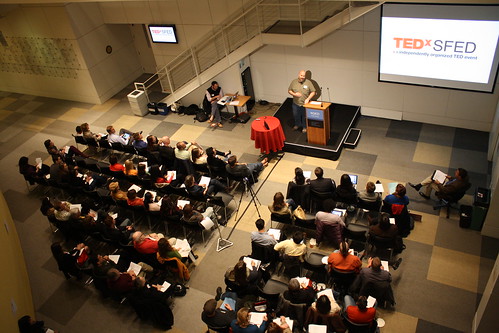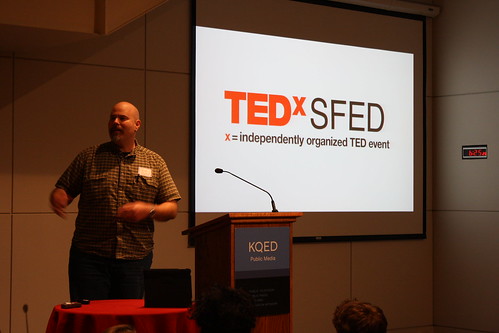
I had a great time last night, speaking at the TEDxSFED Speaker's Search at KQED Public Radio. There were 14 of us, ranging from a parent to a corporate CEO.
We'll find out soon who made the top spot and an invite to speak at TEDxSFED on April 9th.

Here is a copy of my 3-minute talk...
“What if a Jewish person turned into a vampire?” Kirin asked me one day. “Would that vampire be afraid of a Star of David like regular vampires are afraid of a cross?” “That’s the great thing about vampires,” I replied. “Because they are a literary devise, they can do pretty much whatever the author wants them to.”
We talked for about fifteen minutes about Kirin’s Jewish vampire, specifically, weather or not he will cringe at a Star of David, and what that decision might mean. Would it mean that Kirin has replaced the exclusive rightness of Christianity with an exclusive rightness for Judaism? Or will it be more multi-cultural, where the vampire is really cringing at our symbols of goodness and righteousness? Or will all vampires cringe at all holy symbols marking out the many paths up the mountain of faith?
In a deferent year, a puzzled-faced fourteen-year-old girl stuck up a conversation with me one afternoon.
“I was reading here in Hammurabi’s code.” She began. “I get how it says that if the farmer doesn’t keep the levees on his land in good repair, and when the river floods, the levee breaks and ruins his neighbor’s land that he’s responsible to repair the damage and pay the neighbor for the neighbor’s ruined crops. I get that,”
“But what if the farmer was renting the land?”
Both of these children were in classes of mine at Skyline High School, across the bay in Oakland. What makes these children remarkable is not their uniqueness; I could talk all night, telling you similar stories. What makes them remarkable is that these stories of curiosity and wonder come from a so-called “failing school.”
You see, the problem for these children, and my school is that neither Babylonian rental law and nor Jewish vampires are on the high-stakes test in Spring.
The center piece of No Child left Behind is that all schools will have all students testing at “proficient” or above in reading and math by 2014.
100% of schools
100% of students “Proficient” or above in reading and in math.
A goal like that leaves little room for wonder. It leaves little room for creativity; for divergent thinking.
A goal like this reduces schools and teaching to an integrate game of trivial pursuit with only two categories of value.
So, contrary to the wisdom enshrined in the name of the legislation, children like these are told that what they are good at doesn’t count and what they are curious about doesn’t matter.
I had hope that things would be different after the 2008 elections, but as a new set of testing gurus begin work on a new set of tests, my hope fades.
I hope we can all take a deep breath and remember that education is a lot more complex than the score on a single test.
I hope we can come to our senses and demand that our government does away with these tests. As the farmer says, “You can’t fatten the hog by weighing it.”
We need fewer tests in our schools. We need more room for curiosity, more room for wonder. We need more room for Jewish vampires.

